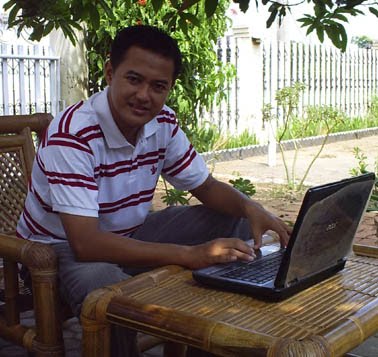Marriage is the important thing in human being's life, due to is not only concern two person who love each other but also included two families and society. According to Tengger society, this's also followed by the soul of the ancient of the couple married. Before wedding party, there's "Nelasih" or pilgrimage and give "Tetamping" or "Sesaji" (present to the god)
Providing all matters concerns with this, sometimes it's called unreasonable, but in fact it's still done by all of people. The way to get married is the same as the other. There is such kind in "Ngadisari" (a small village in Bromo), Tengger that has 9 process in marriage, similar with other region, such as finding the spouse engaging and wedding party itself. Wedding party in Tengger is just for themselves (Endogami)
Eventhough, nowdays, there are Tengger people who marry with other person who comes from other city, but the members are a few. If girls comes from Tengger and a man doesn't, so the wedding party must follow Tengger custom and Hindusm culture. But if a man comes from Tengger and a woman doesn't (for example, she is moslem), the wedding party must follow the Moslem (Islamic) custom. Eventhough, they have married un-Tengger custom, they still become "Tengger" family or they call with "Sedulur"
Ingeneral, young man tries to get his spouse by himself and to decide to date of their marriage, it's depent on their day of birth (they call with "Weton"), similar with in Javanesse date custom. The next step is if hs parents agree, he and his parents must engage. The girls sit beside her parents and the man will say (in Javanesse language) as follow : "Kulo ngriki niki ngarepaken yugo sampeyan" (English = "I come here to get married with your daughter"). And the girl's parents will answer : "Yen bocahe gelem" (English = "If the girl agree with you"). The girl will be asked by her parents : "Apa siro gelem dikarepake si ......" (English = "Do you want to get married with ......"). Afterwards, she answers with : "Inggih" (English = "Yes, i do"). It's meant that the engagement is received. It's continued by discusing about the wedding party date. In engagement, there's no "Peningset" (a gift from man to woman which we just find in Javanesse married custom). Because according to the Tengger society, "Peningset" is the same with owe, not a gift
Oneday, before the wedding party begins, man's family come to his wife's family bringing rice and many other things. This's held in the girl family's house in the morning. The man sits on the right sight of talesman ("Dukun", leader in the village) and the girl's family is in the left side. In front of them, there are "Sesaji" (sacrifice) with 5 kind of them like 5 plates of white-red "Jenang" (cake), 1 plate of "Arang - arang Kambang", 7 plates of rice and eggs, "Pisang raja" (king banana), 7 plates of "Golong" rice and egg, some money. The talesman read the incanted with holding the right hand of woman's family and man's family. They are asked to follow what the talesman said
Sometimes, the marriage is canceled because :
They are still a relative
Example : they are still one "Canggah" (canggah is grandmother of grandmother)
Dadung Kepuntir
Example : A, B and C have each sons and also daughters. They are one Canggah. But A's sons marries b's daughter, B's son marries C's dauughter and C's son marries A's daughter, so a kind of this is not allowed
Papakan Wali
Example : A, B each of them have sons and daughters. A's son marries B's daughter. The second A's son marries the second B's daughter
Kesandung Watang or Kerubuhan Gunung
Example : If one of their family is died, so the wedding party had to canceled and return to first engagement process
If there’s something to cancel the wedding, such as Kesandung watang or Kerubuhan gunung, so the man and his parents come to wife family’s house to say : “Kulo ngriki niki nilar yogane sampeyan, sarehning wonten alangan, mbok de pejah …..”. In English is meant “I come here to leave your daughter, because my aunt died ……”. And the girl’s parent answer “Kebeneran siro wurungake sarehne mbokde siro ora ono …”. In English is meant “You are right to cancel it, because your aunt died …”
People who can be “Wali” (someone who agree the marriage) are father, grandfather and so on and uncle. If there’s no “Wali”, leader of the village can be “Wali” and called by “Wali Bumi”. This rule is not different from Islamic rule
Farming
Tengger people are good farmer. Men and women work together in the farming area. “Api – api” or “Begenan” is the way to welcome the guest, they present you to come to their kithen with dringking coffee and eating potatoes boil there. This is their tradition
Their kitchen is made of cement and tile and wood. Because of the situation is cool, so their brazier lways flame and a hot waterin the boiler. Trivet in the kitchen as also for sitng if there’s a guest. They speak and drink coffee. They make it by themselves, so it’s nicer. They also est potatoes. Speaking near the flame makes us warm
Native Tengger people do not want to leave their village, because they think that it’s enough to fulfil their life’s needs. They plant potatoes, cabbage, vegetables, and also corn for main food. In general, they have strong powerto walk faraway and bring an heavy thing
The characteristic of this people is wearing “Sarung”, wherever they go, men or women, because of cool, They do not want to get the knowledge from other city. Their faith with culture and religion, makes them pure and strong, not influenced by other life and culture
















Comments :
0 comments to “Bromo (6) : The Tenggerese Culture (3)”
Post a Comment